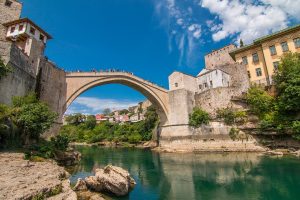
The Balkan Peninsula takes its name from the Balkan Mountains that stretch all the way from the Serbian-Bulgarian border to the Black Sea. Located in South Eastern Europe, the exact definition of the Balkans is often disputed. Nevertheless, the countries that either entirely or partially lay within its borders are diverse in their culture and attitudes. To get you started, here’s 10 key values from across the region taken straight from our guides:
- It is only in the last decade or so that foreign travel has been available to majority of Romanians. Irish writer Bram Stoker’s Dracula is thought to have been inspired by the Romanian Vlad Tepes. Few Romanians, however, had heard of the Dracula myth before 1989 and were initially bemused when tourists arrived in Transylvania expecting sinister Gothic Castles. Bran Castle, which has become the unofficial ‘Dracula’s Castle’ is in fact a rather pretty building.
- Romanians tend to be superstitious. Spilling salt on the table is considered unlucky, but this can be offset if the spiller puts some of the salt on their forehead. Salt is also sometimes thrown into a storm to try and end it!
- Bosnians are also a very superstitious people and tend to believe in fate and the use of natural remedies is an excellent example of this. To get rid of a fever, a mother might wrap their child’s feet in vodka-soaked rags with a potato!
- Personal and collective pride and honour are important values in Serbian Culture. This extends from the work they do and the produce they create, to national achievement in the political sphere.
- Serbs are also a very hard working people and manage a good work-life balance, with general working hours being 8am – 3pm. An important part of any working day especially in state owned institutions, is coffee and cigarette breaks which have proved inconvenient in the past for tourists trying to apply for Visa extensions!
- In Bulgaria, respect for one’s elders is the first family value that any child will learn. Anyone older than oneself is treated respectfully and the oldest are accorded the greatest respect. It used to be the norm for all advice to be sought from the oldest member of the family and then followed to the letter.
- Hospitality and generosity were deeply engrained in Bulgarians during the centuries of living in the Ottoman Empire. They are values that are still taught today, and children learn from the example of their parents opening up the pantry to friends and strangers alike.
- Part of Greece’s territory lies within the Balkan Peninsula. There are hardly any class divisions in Greece and this led to a popular story line of mid-20th Century films being the rich boy/ girl falling for the poor boy/ girl. Love conquers all and both sets of parents are happy with the match!
- The Croats tend to believe that they can do everything that needs to be done by themselves. Mechanics and craftsmen are rarely needed as there’s always at least a friend who can lend a helping hand.
- Croats are especially proud of their nation and, whilst part of their territory may lie within in the Balkan Peninsula, you should not venture into discussing politics unless you know you are in safe company! The story of Croatian identity overcoming waves of foreign rulers can be found in the works of the Croatian writer Miroslav Krlēza, a shaper of national consciousness and an icon of Croatian literature.
To find out more about the Balkans or to plan your next adventure, head to our Europe area page.